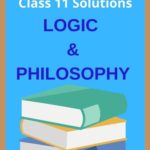Class 11 Logic And Philosophy Chapter 14 Realism The answer to each chapter is provided in the list so that you can easily browse throughout different chapters SCERT Class 11 Logic And Philosophy Chapter 14 Realism and select need one.
Class 11 Logic And Philosophy Chapter 14 Realism
Also, you can read the SCERT book online in these sections Solutions by Expert Teachers as per SCERT (CBSE) Book guidelines. These solutions are part of SCERT All Subject Solutions. Here we have given Assam Board Class 11 Logic And Philosophy Chapter 14 Realism Solutions for All Subjects, You can practice these here.
Realism
Chapter – 14
LOGIC & PHILOSOPHY
VERY SHORT TYPES QUESTIONS AND ANSWERS
1. Give the correct answer :
(a) According to realism object of knowledge has/has not independent existence.
Ans : Has.
(b) According to realism, the object of knowledge is/is not determined by knowledge.
Ans : Is not.
2. Answer in brief :
(a) What is realism?
Ans : According to realism, the object of knowledge has extra mental independent existence.
(b) What are the different types of realism?
Ans : The two different types of realism are Naive realism and critical realism.
(c) Name three realist philosophers.
Ans : Locke, Perry, Russell are three realist philosophers.
3. What is realism?
Ans : Realism is a theory of knowledge according to which object of knowledge has extra mental independent existence. Objects exist outside by their own right, mind may know or may not know them. If the object of knowledge has no independent existence, then knowledge is impossible, so, knowledge in determined by its ‘object, There is no internal relation between knowledge and its objects.
4. What are the characteristics of Realism?
Ans : The characteristics of realism are :
(i) The object of knowledge has independent existence. Objects exist in the external world with their qualities and no way dependent on anything else.
(ii) Objects exist in the external world and in no way dependent on any knowing mind.
(iii) There is no internal relation between knowledge and the objects of knowledge. The relation between knowledge and the objectiu knowledge is external.
(iv) Existence of object never depends on knowledge of it. Mind may know or may not know, but the existence of object of knowledge does not depend on knowledge of it.
(v) The world is full of things and events which is no way dependent for its existence on mind. Mind can not influence the existence of object.
| Sl. No. | Contents |
| Unit – 1 | Logic |
| Unit – 2 | Proposition |
| Terms | |
| Proposition | |
| Transformation of Ordinary Sentences to Logical Proposition | |
| Distribution of a term is a logical Proposition | |
| Modern Classification of Proposition | |
| Unit – 3 | Inference, Categorical Syllogism |
| Inference | |
| Categorical Syllogism | |
| Unit – 4 | Symbolic Logic |
| Unit – 5 | Philosophy |
| Unit – 6 | Indian Philosophy |
| Unit – 7 | Theory of Knowledge |
| Rationalism & Empiricism | |
| Pramāna: Pratyaksa and Anumana | |
| Unit – 8 | Realism and Idealism |
| Realism | |
| Idealism |
5. Give a brief account of realism as a theory of the nature of object of knowledge?
Ans : External objects are outside and independent of mind. Knowledge is an exact copy of representation of the extra-mental objects. Realism is the theory, which recognizes the reality of the external world independent of minds. John, Holt, Perry, Alexander, Russell etc. are the supporters of realism. For them, the object of knowledge never depends for its existence on knowledge. Knowledge is not the criteria to determine the existence of an object. If the object of knowledge has no independent existence, then no knowledge is possible. Knowledge is determined by its objects. So, everything has extra mental independent existence.

Hi, I’m Dev Kirtonia, Founder & CEO of Dev Library. A website that provides all SCERT, NCERT 3 to 12, and BA, B.com, B.Sc, and Computer Science with Post Graduate Notes & Suggestions, Novel, eBooks, Biography, Quotes, Study Materials, and more.




Why there is so much add in this website plz improve…I got annoyed